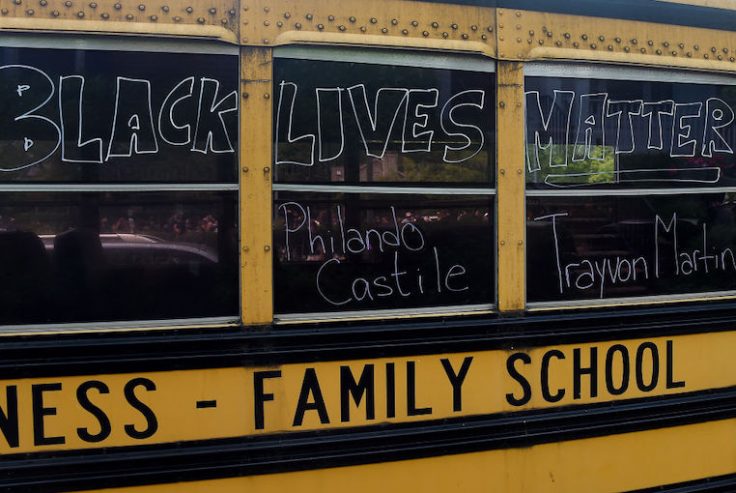A top Pennsylvania school district is pushing its teachers to infuse critical race theory into classrooms through "racial equity learning resources" that argue America is systemically racist and condemn merit-based policies as "rooted in whiteness."
Pittsburgh Public Schools, the state's second-largest district, hosts on its website an array of "racial equity learning resources" that train educators on topics such as "whiteness" and how to be "culturally responsive as a white teacher." One resource includes curriculum materials developed from critical race theorist Ibram X. Kendi's Stamped: Racism, Antiracism, and You, which argues that "racist ideas have been stamped" into the nation's "Constitution, laws, policies, practices, and beliefs of segregationists and assimilationists." Lessons inspired by the book ask students to explain how America's government is "emblematic" of the statement, "Racism is the bedrock of the USA." They also state that "meritocracy and the American dream narrative are rooted in whiteness."
The district's push to provide teachers with training centered on critical race theory comes as Pennsylvania Democrats make sweeping changes to state standards for teachers. Democratic governor Josh Shapiro's administration last year released "Culturally-Relevant and Sustaining Education" guidelines, which require educators to recognize schools' "inequities and institutional biases" before they can become licensed to teach in the state. For Pennsylvania lawmaker Barbara Gleim (R.), those guidelines are part of a years-long push to support "race theory teaching" through "multi-level educational training webinars and embedded class indoctrination."
"The entrance of race theory into Pittsburgh Public Schools is not surprising," Gleim told the Washington Free Beacon, "as parents have been attending school board meetings across the state with evidence that school assignments are riddled with questions about diversity, equity, and inclusion, social and emotional learning, social justice issues, and secular viewpoints concerning gender ideology."
Pittsburgh Public Schools did not return a request for comment.
In addition to its Kendi-inspired curriculum materials, Pittsburgh Public Schools' teacher trainings include a webinar that labels "middle to upper class white, heteronormative, Judeo-Christian, able-bodied, English-speaking" men as those complicit in promoting "whiteness." The training describes "whiteness" as a "place of advantage, privilege, or domination" that shapes "institutions, policies, and social relations," which mirrors a key tenet of critical race theory. The educator training resource also argues that individuals are racist even if they don’t intend to be and the only remedy is proactive efforts at "antiracism." In line with this thinking, teachers are told not to teach "colorblindness."
The district's teacher trainings also explore at length the Black Lives Matter movement. The webinars explain how to discuss the movement with students, particularly in order to "correct any misconceptions they might have about the movement." One misconception, the teacher trainings suggest, is that Black Lives Matter is violent, an argument that washes over the fiery riots that took place during the summer of 2020, which caused more than a billion dollars in damage and took several lives. The training resources also encourage teachers to talk about social justice protests with their students because they "have a really critical role" in developing patterns of behavior "that will hopefully carry throughout [a student’s] life." Another resource asks teachers if their students can explain the "role of civil disobedience in a democratic society."
"Dismantling Racism in Education," another material presented in the district's "racial equity learning resources," calls on "white educators" to "do the work that’s necessary to disrupt whiteness and white supremacy" within themselves and their classrooms. A video for educators on how to be "culturally responsive as a white teacher," meanwhile, pushes teachers to be activists for "critical consciousness." A training on "the spirit murdering of black children" argues that teachers "‘spirit murder’ the souls of black children every day through systemic, institutionalized, anti-Black, state-sanctioned violence." According to that resource, "school practices and officials are slowly killing Black children by murdering their spirits through intentional actions, physical assaults, and verbal stabbings."
Socialist intellectual Howard Zinn also inspires resources for Pittsburgh Public School officials as well. The Zinn Education Project embodies the socialist ideals of its namesake and claims to provide "a more accurate, complex, and engaging understanding of history than is found in traditional textbooks and curricula."
The district's open embrace of critical race theory stands in contrast to other Pennsylvania districts that have implemented controversial materials in a more subtle manner. Philadelphia's Great Valley School District, for example, denied using critical race theory materials as it simultaneously distributed a webinar to dozens of teachers in the district aimed at guiding them on how to teach students critical race theory under the radar.
Pittsburgh Public Schools, on the other hand, states openly on its website that Social Emotional Learning, a teaching pedagogy rooted in social justice narratives, is "the foundation on which academic learning takes place." It is "equally important," the district says, to master those "soft skills" as it is to master important academic skills such as reading and math. Additionally, the district’s website offers suggested materials for students on various race-focused subjects.
"As a parent and former school board member, I have grave concerns—especially for parents, who ultimately have the last say about what is being taught to their children," Gleim told the Free Beacon. The Republican lawmaker introduced a bill last month seeking to bolster parents' rights and end the requirement that teachers "know and acknowledge that biases exist" in education in order to obtain their teaching licenses. "In most areas of the state, including Pittsburgh, reading and math scores have declined significantly, yet the emphasis on student outcomes remains on these social soft skills and health-related issues that many parents believe to be in their purview of responsibility," she said.
